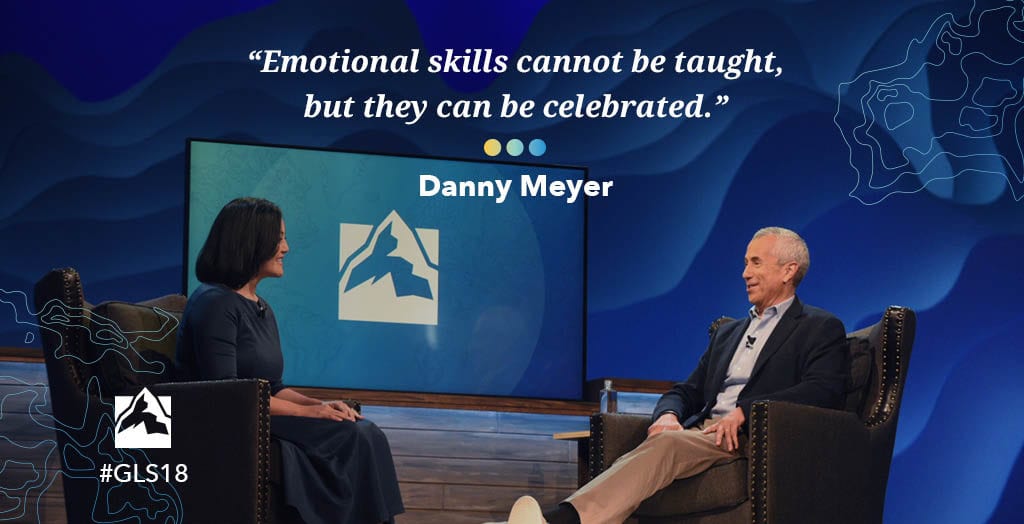Lesson 2: In this session of the Hospitality GrowthTrack, you will learn how a great hospitality experience differs from customer service.


By Danny Meyer
The 1980s were the decade of the “service economy.” Virtually all of corporate America was being challenged to respond to a cry for more service—from rental car companies to banks to the U.S. Postal Service. That trend appeared in our industry as well—sometimes paradoxically, at the expense of hospitality.
In the prevailing view of service, guests were to be treated to more coddling, more choices—and more interruptions. Did restaurants really need to offer a choice of four breads, two butters, and any number of special knives at dinner? Did the one-bite, pre-meal morsel known as the amuse-bouche, or in some restaurants the amuse (a gift from the chef), really require a one-minute description of every ingredient and cooking method? Every choice meant another needless intrusion by the wait staff on guests’ time and attention. What mattered most to me was to provide maximum value in exchange not just for the guest’s money but also for their time. Anything that unnecessarily interrupts a guest’s time with his or her companions or disrupts the enjoyment of the meal undermines hospitality.
The beautiful choreography of service is, at its best, an art form, a ballet. I appreciate the grace with which a table can be properly cleared. I admire the elegance with which a bottle of wine can be appropriately opened, decanted, and poured. There’s aesthetic value in doing things the right way. But I respond best when the person doing those things realizes that the purpose of all this beauty at the table is to create pleasure for me. To go through the motions in a perfunctory or self-absorbed manner, no matter how expertly rendered, diminishes the beauty. It’s about soul—and service without soul, no matter how elegant, is quickly forgotten by the guest.

Understanding the distinction between service and hospitality has been at the foundation of our success.
Service is the technical delivery of a product. Hospitality is how the delivery of that product makes its recipient feel. Service is a monologue—we decide how we want to do things and set our own standards for service. Hospitality, on the other hand, is a dialogue.
To be on a guest’s side requires listening to that person with every sense and following up with a thoughtful, gracious and appropriate response. It takes both great service and great hospitality to rise to the top.
When you are seated at the precise time of your reservation at the exact table and with the waiter you requested, that is a reflection of great service. When the food is delivered to the right person at the right table at the right temperature at the right time—that’s service. When you see a member of the waitstaff decanting a bottle of wine with care and grace, that’s service. When your empty plate is cleared from the table in a graceful manner, that too is service. When, in answer to your question, the waiter can explain the nuances of the wines on our list, that’s service.
But hospitality, which most distinguishes our restaurants—ultimately any business—is the sum of all the thoughtful, caring, gracious things our staff does to make you feel we are on your side when you are dining with us.1
It takes both great service and great hospitality to rise to the top.
1 Excerpt from pp.64-8 [539 words] from SETTING THE TABLE by DANNY MEYER. COPYRIGHT (C) 2006 BY DANNY MEYER. Reprint by permission of HarperCollins Publishers.
For each of the following questions, write down your reflections in your journal.
1. In your own words, how would you describe the difference between service and hospitality?
2. Think about your own hospitality context. How does understanding the difference between hospitality and service give you a new perspective on how guests experience your organization?
3. Identify one area where you could move from a service mindset to a hospitality mindset.
Get feedback from a person who experiences your hospitality. Schedule a short phone call or meeting with a guest and discuss:
1. What do they observe about hospitality in your context?
2. What’s the ambiance in your facility? How does it make them feel?
3. What are the personal interactions like?
4. What’s working right?
5. What could be improved?
We welcome and encourage comments on this site. There may be some instances where comments will need to be edited or removed, such as:
If you have any questions on the commenting policy, please let us know at heretoserve@globalleadership.org
“We welcome and encourage comments on this site. There may be some instances where comments will need to be edited or removed, such as:
If you have any questions on the commenting policy, please let us know at heretoserve@globalleadership.org”